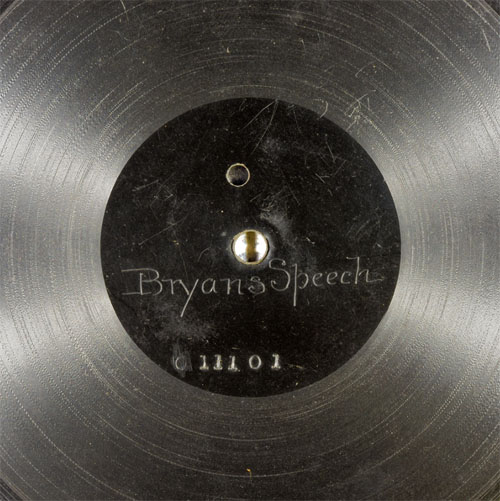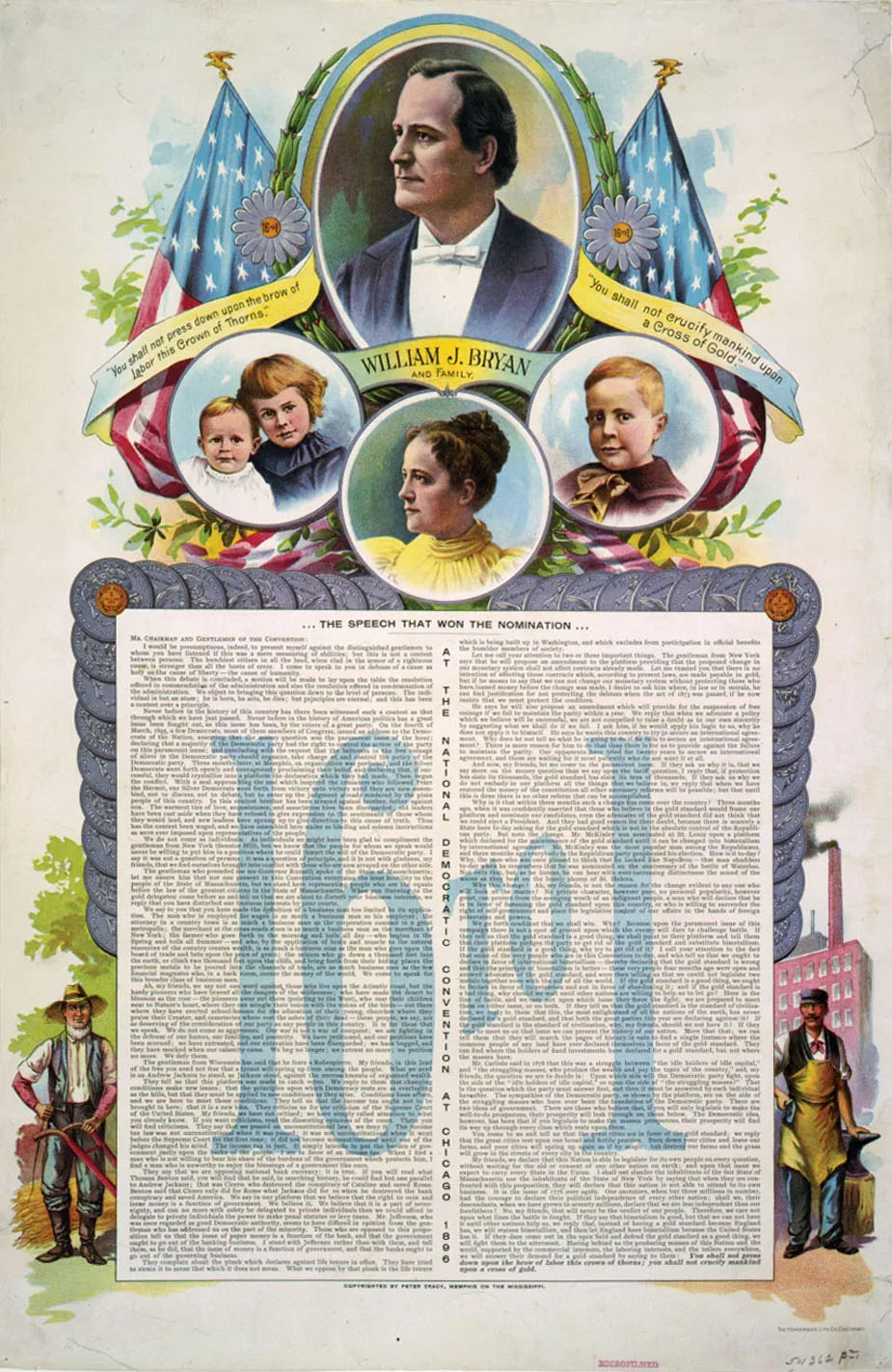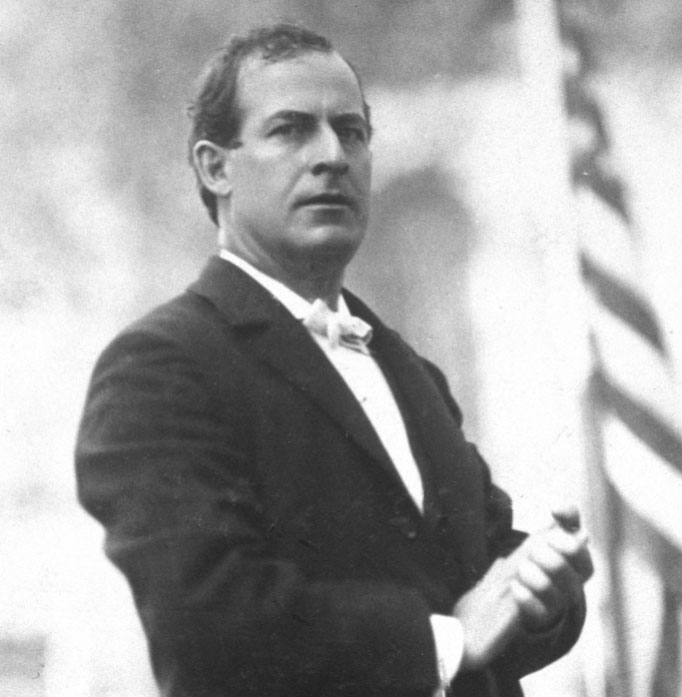William Jennings
Bryan and
the Phonograph
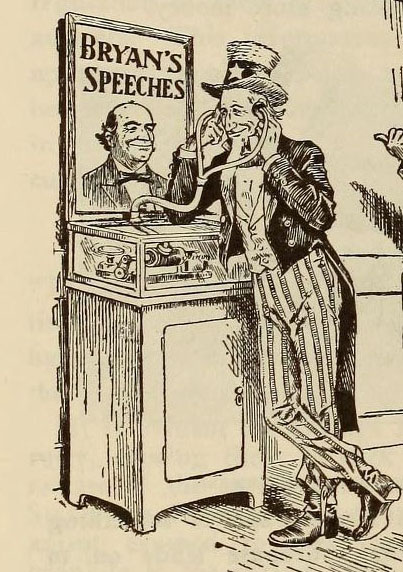
By Doug Boilesen, 2022
William Jennings Bryan, Nebraska's
Boy Orator of the Platte, the Great Commoner and
leader of the Populist movement in the late nineteenth and early
twentieth century played a prominent role in American politics
and popular culture. He was the Democratic nominee for President
three times (1896, 1900 and 1908) and the subject of many conversations.throughout
those years.
Much
of the press, particularly in the East, opposed Bryan's populist
platform which included the unlimited coinage of silver, a graduated
income tax, nationalization of the railroads, a decrease in immigration,
antitrust laws and other government regulations of business. Many
of the characterizations and illustrations of Bryan, therefore,
were negative. (See "Well,
what do folks in New York think of William Jennings Bryan?"
from Willa Cather's O' Pioneers and Willa Cather and
William Jennings Bryan, Doug Boilesen, PhonoBooks,
2022.)
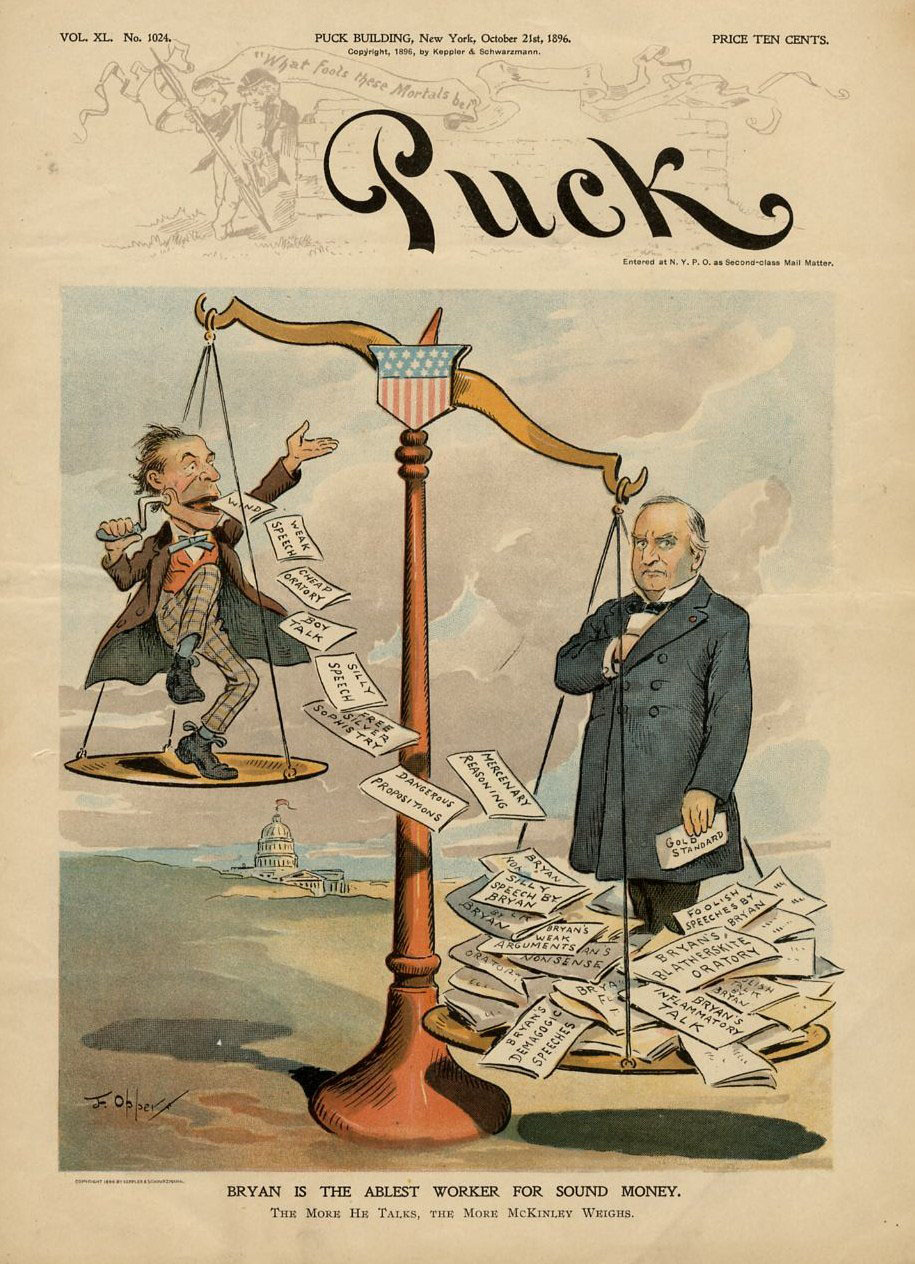
Bryan, The Talking
Machine, Puck, Jos. Opper. October 21, 1896 (PM-0527)
The 1896 and 1900 Presidential
Elections
No recording exists of Bryan from
the 1896 Presidential campaign but Bryan's most famous speech
from that election, "The Cross of Gold" and the one
that got him the Democratic nomination, was released by Zonophone
Records as a monologue circa 1900 by John Kaiser (DAHR)
(Listen below on i78s.org, from the David Giovannoni Collection).
The Cross of Gold Speech,
Campaign poster from the 1896 U.S. presidential election with the
text of William Jennings Bryan's “Cross of Gold” speech, colour
lithograph. Library of Congress, Washington, D.C. (digital file
no. 3g02112u)
An article titled Campaign
Records appeared In the October 1900 edition of The Zon-o-phone
Record where it was announced that records "which embrace
the most notable utterances that have as yet been made during the
campaign by the Presidential nominees" had been made, two of
which were by Bryan: "Mr. Bryan's utterances on Our National
Destiny (Record No. 9245), and on the Philippine Question (Record
No. 9244) have been faithfully reproduced."
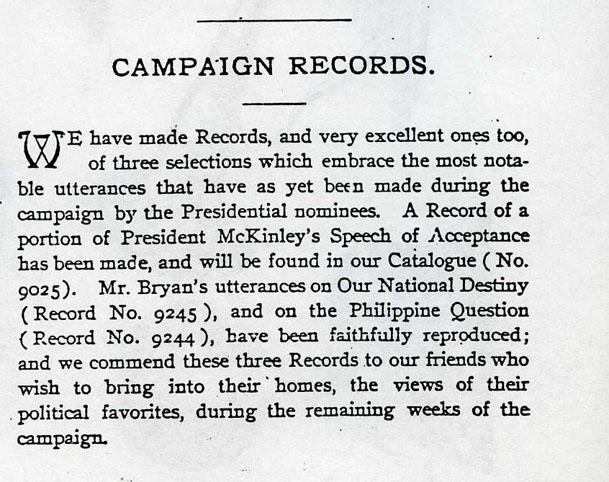
The Zon-o-phone
Record, Vol. II, No. 3, New York, October, 1900
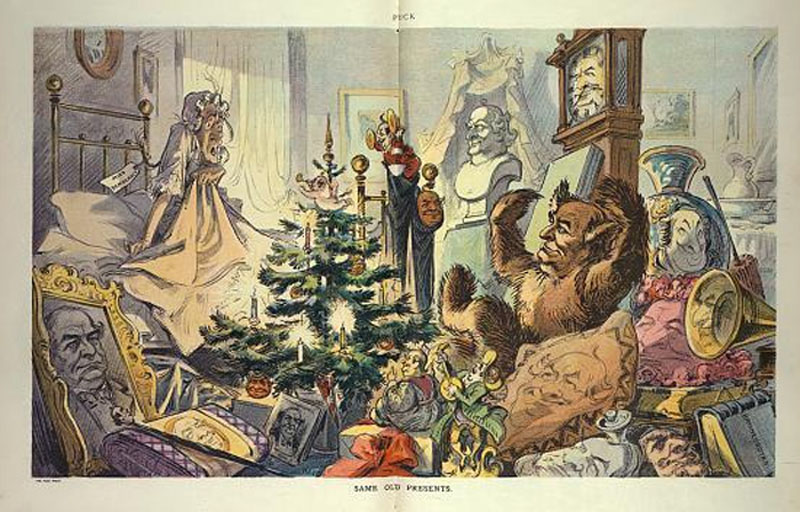
SAME OLD PRESENTS,
Puck, December 25,
1907 by Keppler & Schwarzmann
(centerfold)
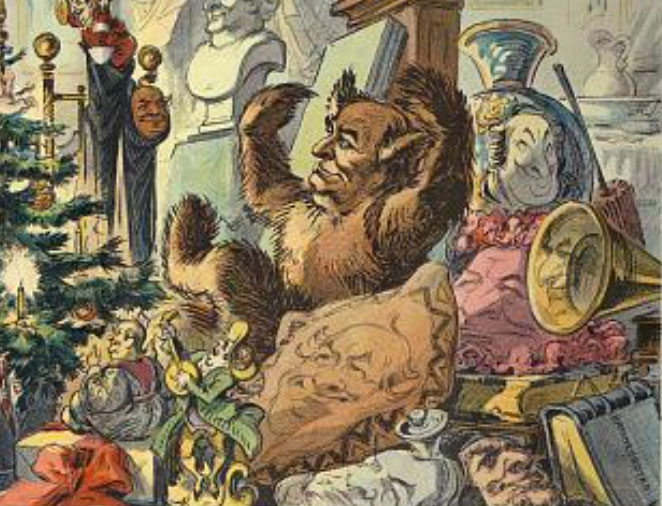
Puck, December
25, 1907 centerfold with 'Bryan' gifts brought by Santa including
a gramophone.
Excerpt from lecture
The "Prince of Peace" recorded by Bryan, May 5-6, 1908.

The Talking Machine
World, May 15, 1908

"Immortality,"
Victor 10" Black Label No. 5534
June 1908 (Courtesy i78s.org).
The 1908 Presidential
Election: Bryan vs. Taft
To
promote his positions in the1908 Presidential election Bryan led
the way by recording ten of his speeches on Edison records. Not
to be outdone Taft, the Republican nominee, soon issued twelve Edison
records.
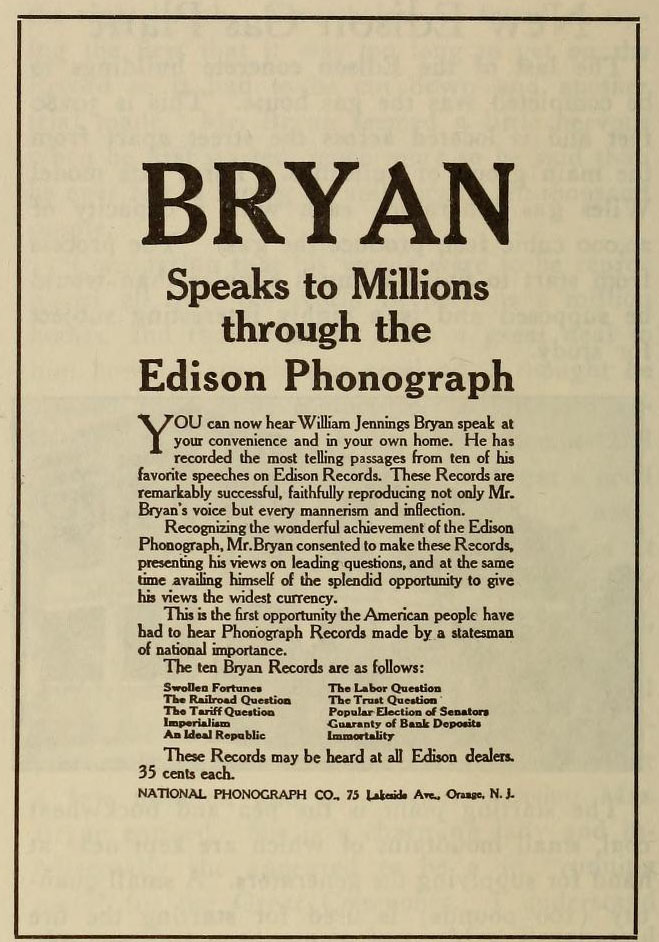
The Edison Phonograph
Monthly, July 1908
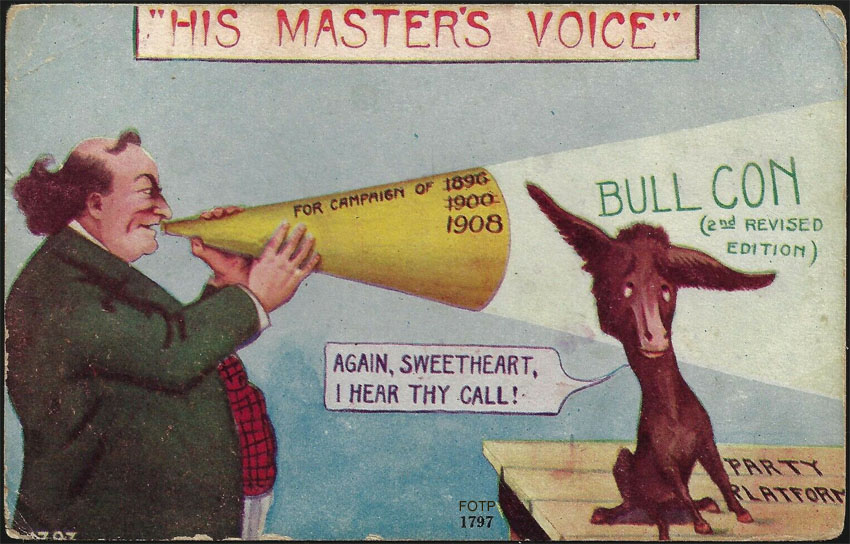
His Master's Voice
- William Jennings Bryan running again in 1908 (postcard, PM-2109)
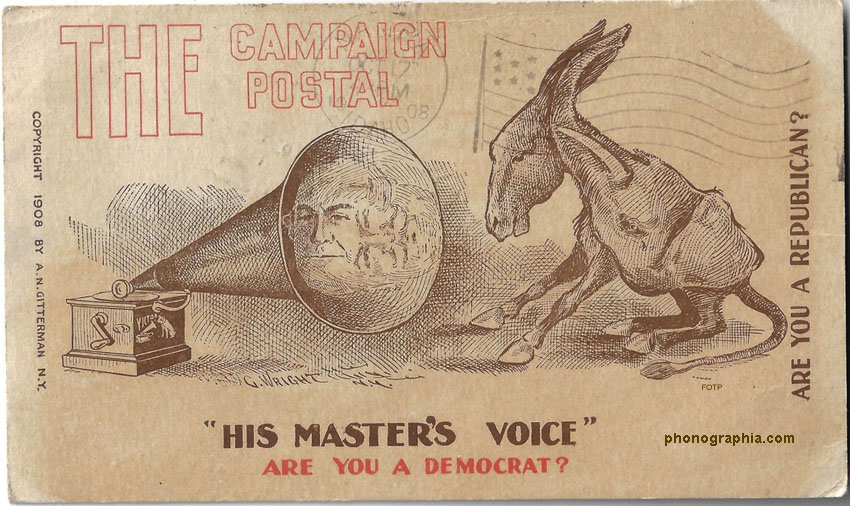
His Master's Voice
- William Jennings Bryan running again in 1908 (postcard, PM-2110)
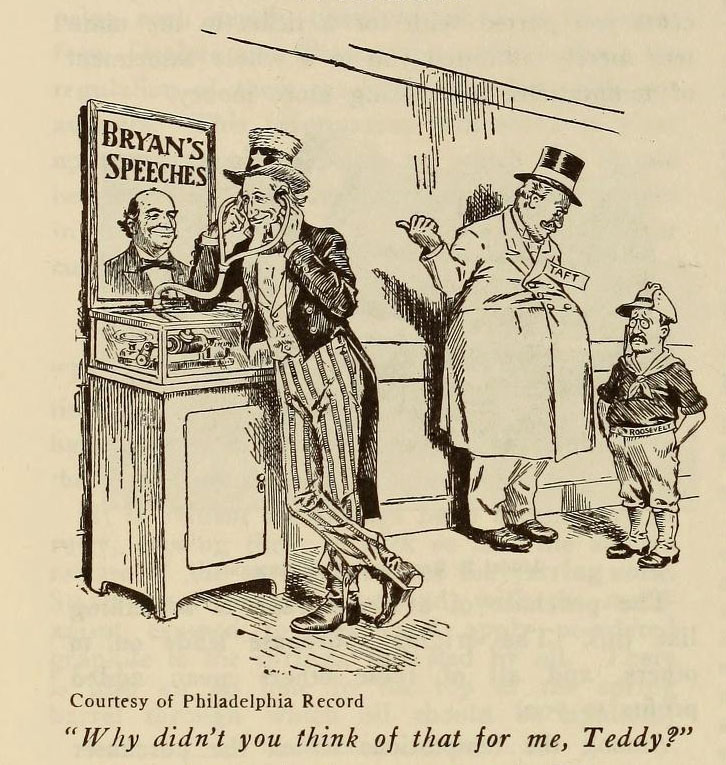
Edison
Phonograph Monthly, August 1908
William Jennings Bryan, in his Presidential
bid of 1908 recorded a series of cylinder phonograph records for
the Edison Phonograph Company. In this cartoon, Taft is seen complaining
that he has missed out on this innovative campaigning. The Edison
Phonograph Monthly in September 1908, however, announced the
release of 12 Edison Records by William H. Taft made at Virginia
Hot Springs, after Mr. Taft delivered his speech of acceptance at
Cincinnati. The EPM called this an announcement of great importance,
noting that "no matter how the November election may result
we shall have Records by the next President. This makes new history.
It indicates progress."
Ten Edison Records
by William Jennings Bryan
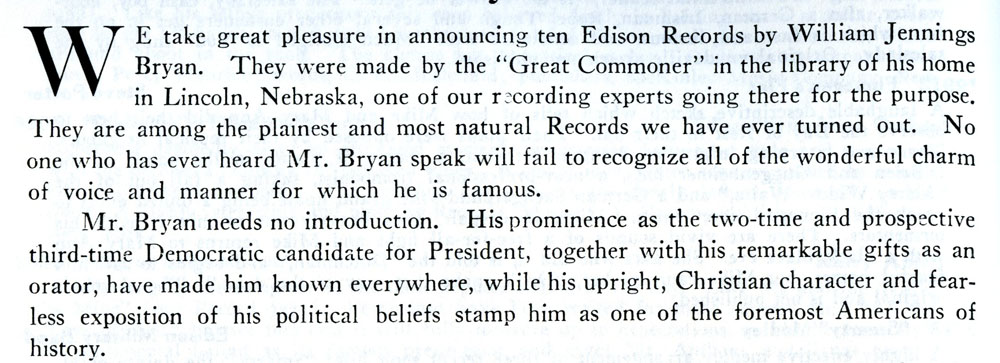
The
Edison Phonograph Monthly, June 1908
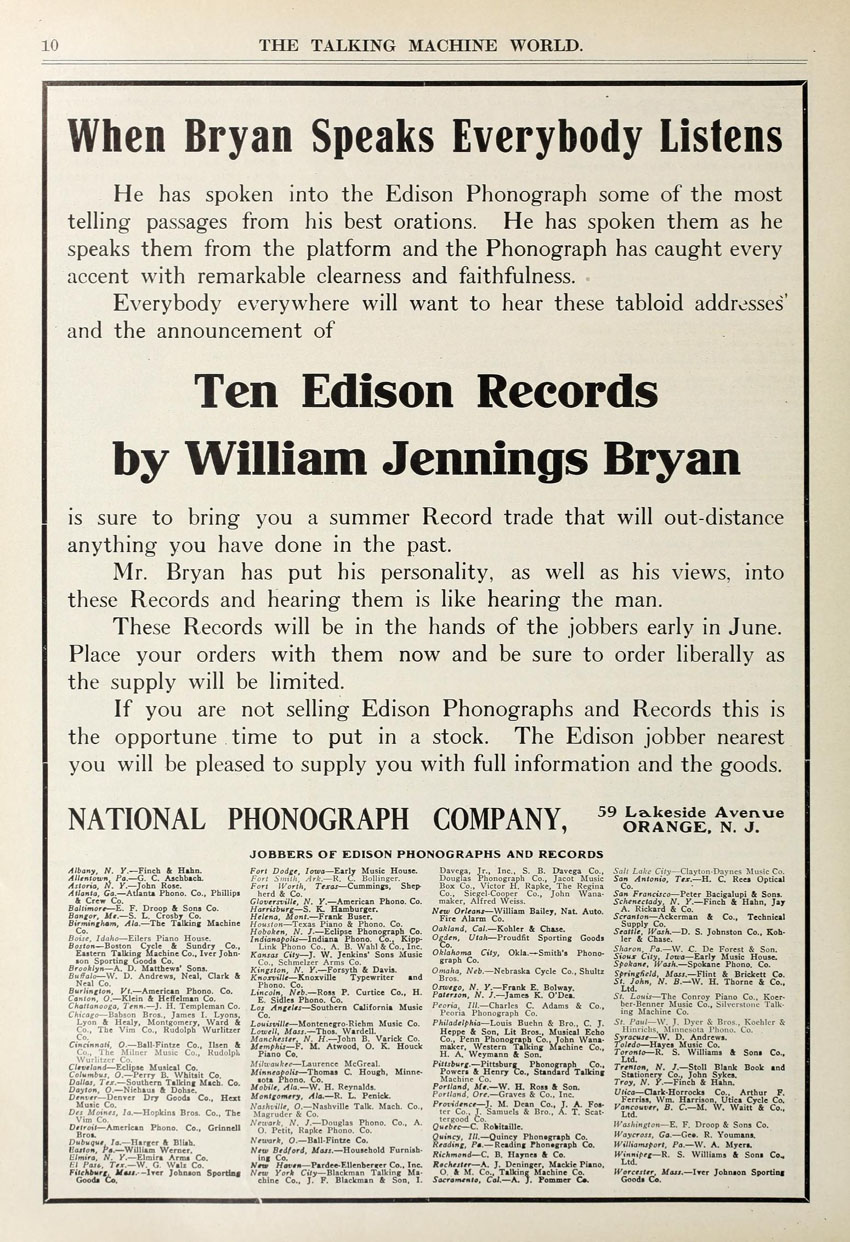
"When Bryan
Speaks Everybody Listens," The Talking Machine World,
June 15, 1908
LISTEN to Bryan's 1908 Recordings
courtesy of UCSB Digital Cylinder Archive and i78s.org
"Swollen
Fortunes" by William Jennings Bryan, Edison Record: 9914
"The Labor Question" by
William Jennings Bryan, Edison
Record: 9915
"The
Railroad Question" by William Jennings Bryan, Edison Record:
9916
"The Trust Question" by
William Jennings Bryan, Edison Record: 9917
"The Tariff Question" by
William Jennings Bryan, Edison
Record: 9918
"Popular
Election of Senators" by William Jennings Bryan, Edison
Record: 9919
"Imperialism"
by William Jennings Bryan, Edison Record: 9920
"Guaranty of Bank Deposits"
by William Jennings Bryan, Edison
Record: 9921
"An Ideal Republic" by William
Jennings Bryan, Edison
Record: 9922
"Immortality" by William
Jennings Bryan, Edison
Record 9923
Bryan's Move in Making Records
of his Noted Addresses Worthy of Emulation by Taft.
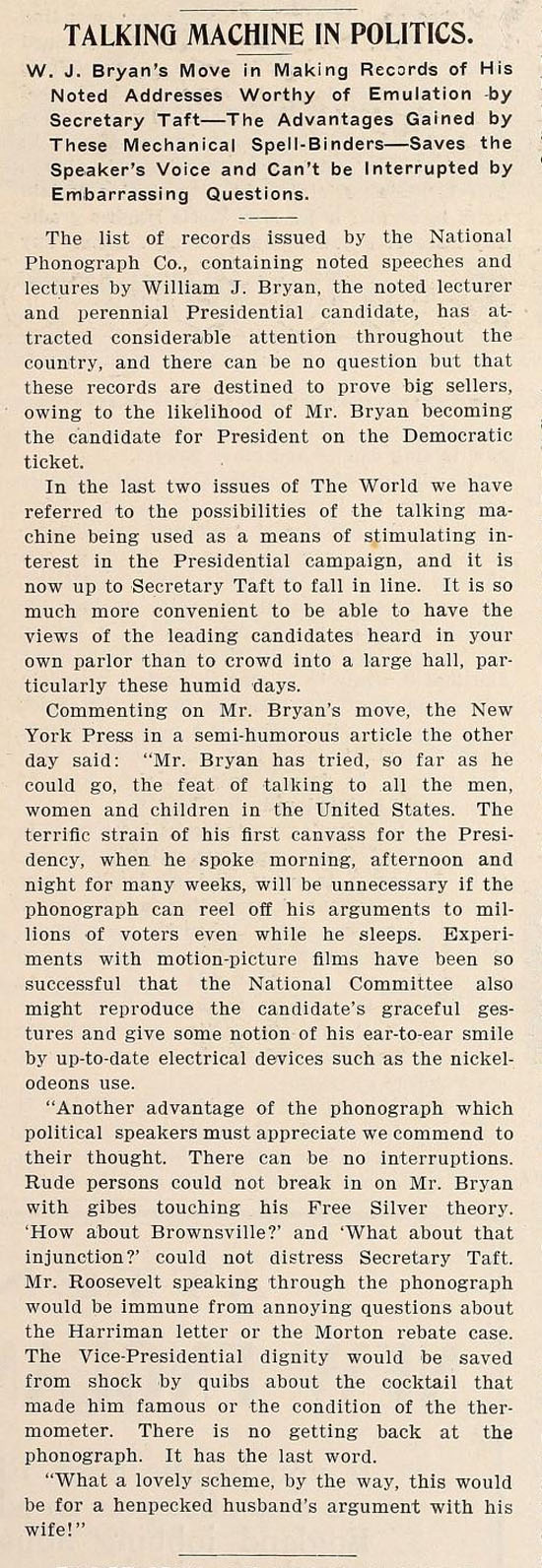
Advantages of Using Phonograph
for Political Speeches, The Talking Machine World, June 15,
1908
'Records' offered everyone the
means to hear the "exact words" of each Presidential candidate
FACTOLA: "Now, for the
first time, one can introduce the rival candidates for the Presidency
in one's own home, can listen to their political views, expressed
in their real voices, and make comparison." The Edison Phonograph
Monthly, September 1908
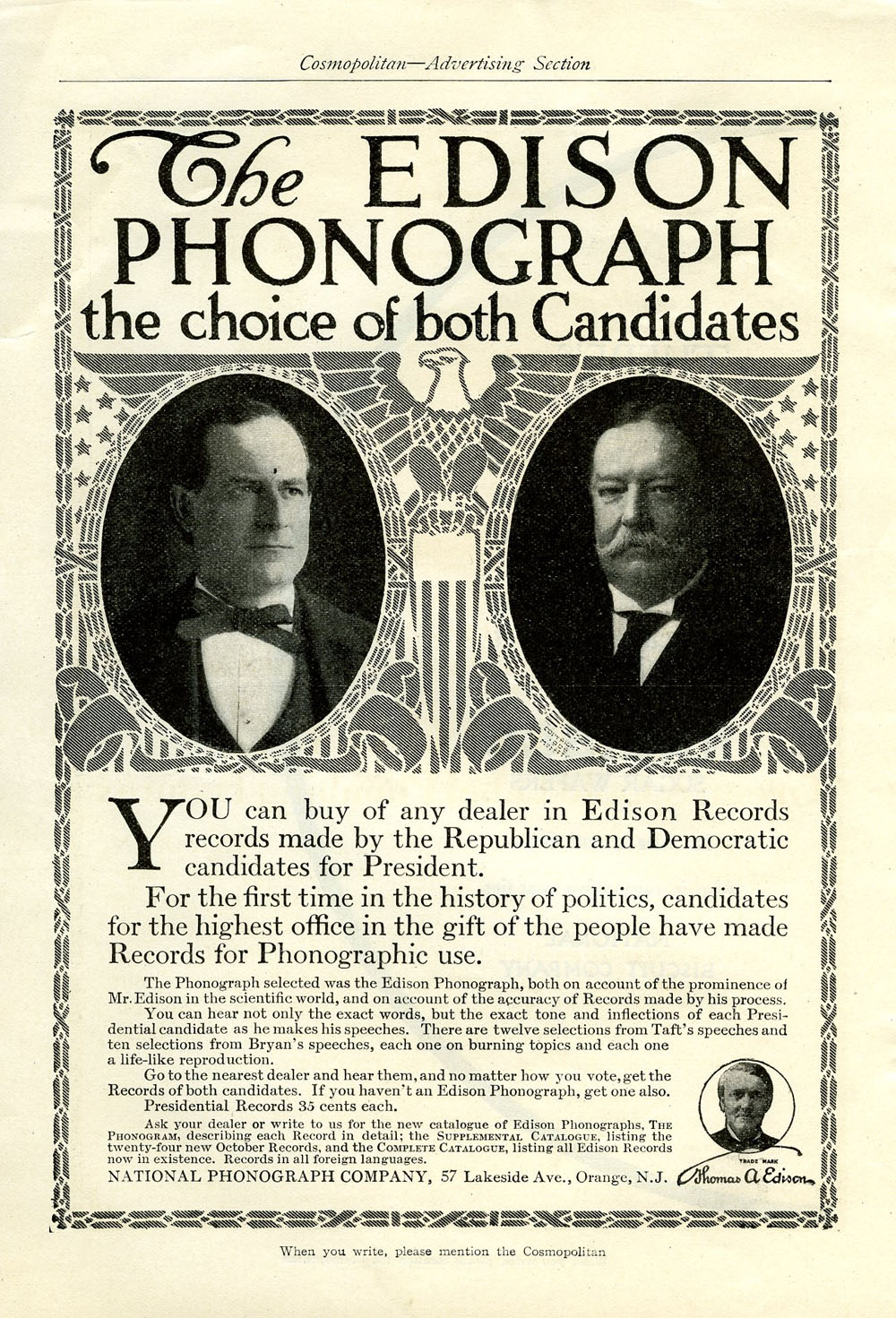
Cosmopolitan,
September 1908
The Edison Phonograph Monthly in
September 1908 announced that Taft Records would now also be available
like the previously issued Bryan records so that "no matter
how the November election may result we shall have Records by the
next President. This makes new history. It indicates progress."
Unfortunately for Bryan his 1908 Presidential
Election loss created a record that Bryan did not want to make or
hear since Williams Jennings Bryan became the only nominated candidate
in the history of the United States to lose three Presidential elections.
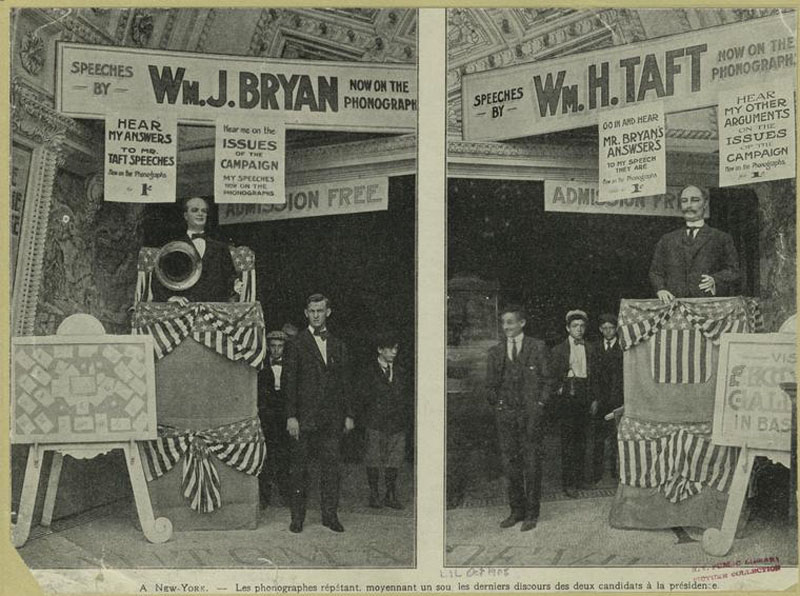
Automatons of Bryan and
Taft at New York City Arcade where phonograph answers for 1908 Presidential
campaign can be heard for 1 cent. (The
New York Public Library, Picture Collection)."
William Jennings Bryan, Secretary
of State 1913-1915
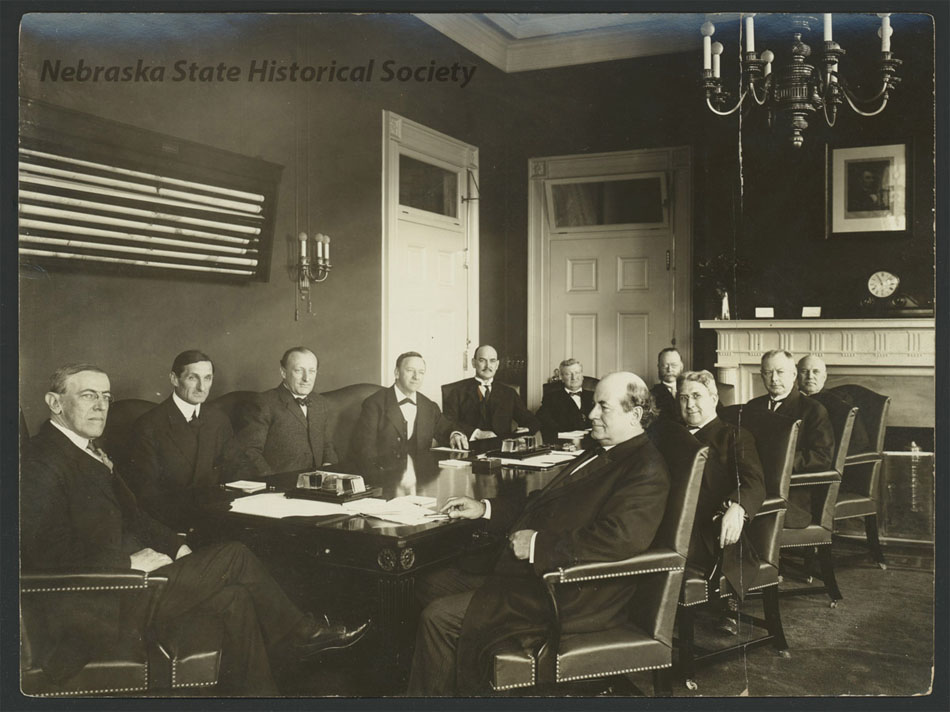
Bryan (seated front right with other
Wilson cabinet members) was appointed Secretary of State by Woodrow
Wilson on March 5, 1913. (Nebraska History, NSHS
RG3198.PH49-5).
Differing views by President Wilson
and Bryan on "how the United States should respond to the sinking
of the Lusitania" led to Bryan’s resignation on June 9, 1915.
See Nebraska
History blog "Secretary of State William Jennings Bryan
and the sinking of the Lusitania" for more details.
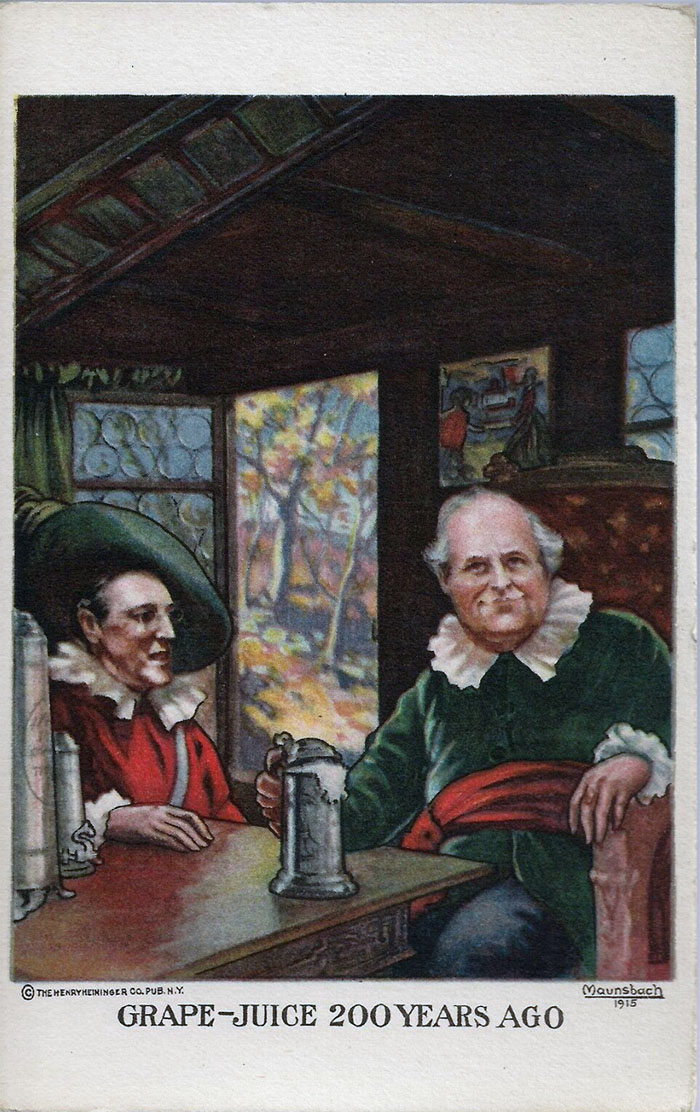
Wilson and Bryan, 1915
Postcard
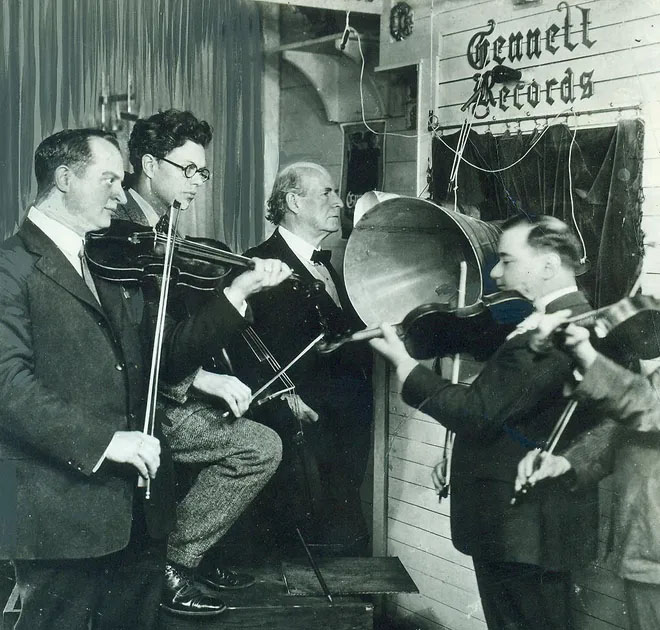
Bryan visited the Gennett
Records Studio in Richmond, Indiana on July 2, 1923 to record his
1896 "Cross of Gold" speech for posterity. (Courtesy Salisbury
Daily Times, October 24, 2020).
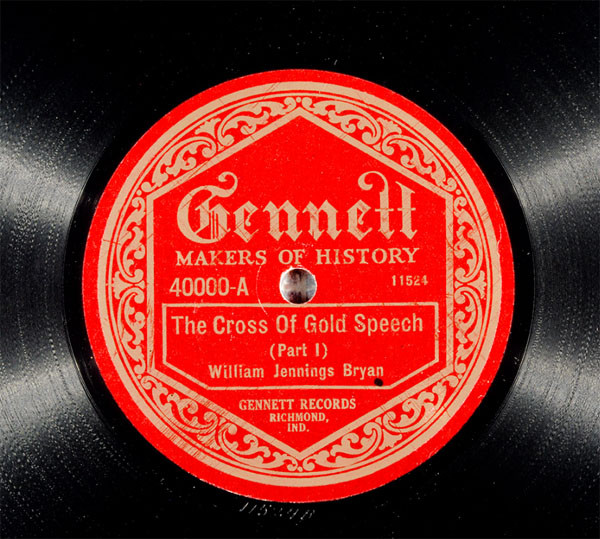
LISTEN
to Part I of Bryan's Cross of Gold Speech recorded by Bryan
in 1923 (Courtesy i78s.org)
Bryan and the Scopes Trial, 1925
William Jennings Bryan argued for
the prosecution, while Clarence Darrow served as the defense attorney
for John T. Scopes, the Tennessee high school teacher accused of
teaching evolution.
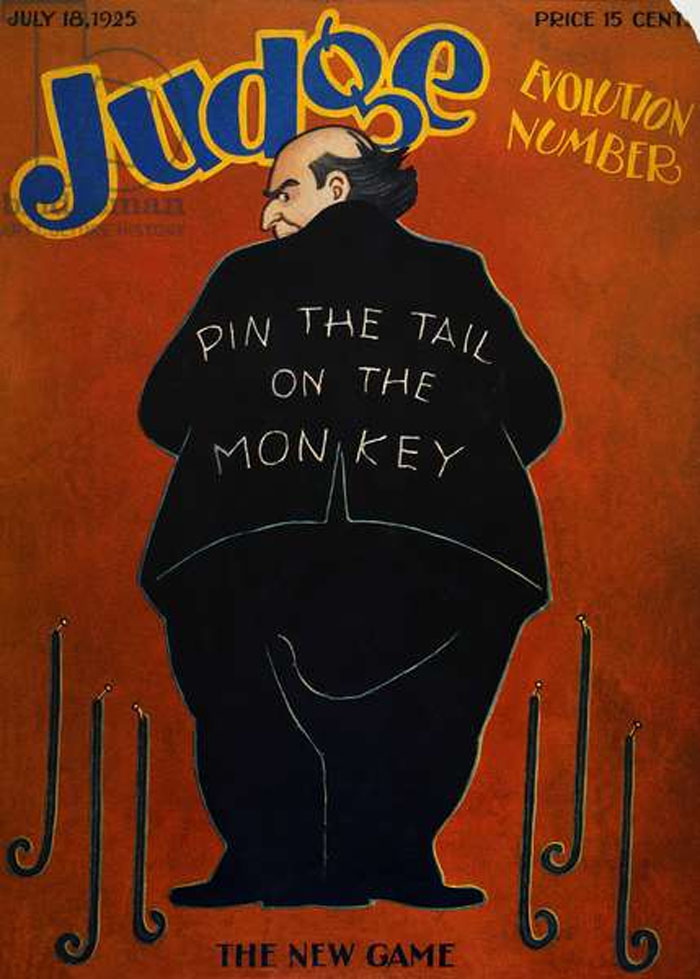
Judge magazine
cover, July 18, 1925.
William Jennings Bryan died on July
26, 1925 just days after the conclusion of the Scope Trial which
ended on July 21, 1925. The Scopes trial, "formally The
State of Tennessee v. John Thomas Scopes, and commonly referred
to as the Scopes Monkey Trial, was an American legal case from July
10 to July 21, 1925, in which a high school teacher, John T. Scopes,
was accused of violating Tennessee's Butler Act, which had made
it unlawful to teach human evolution in any state-funded school."
(See Wikipedia,
The Scopes Trial)
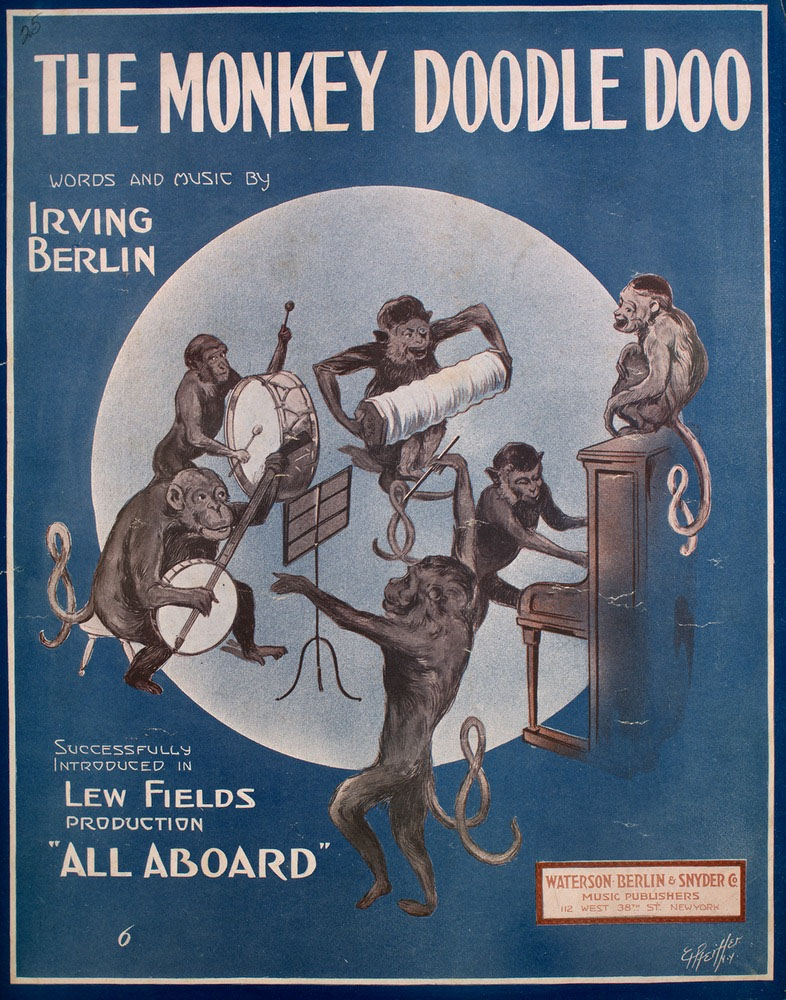
"The Monkey Doodle-Doo"
by Irving Berlin, 1913 (Courtesy the Lester
S. Levy Sheet Music Collection, Johns Hopkins)
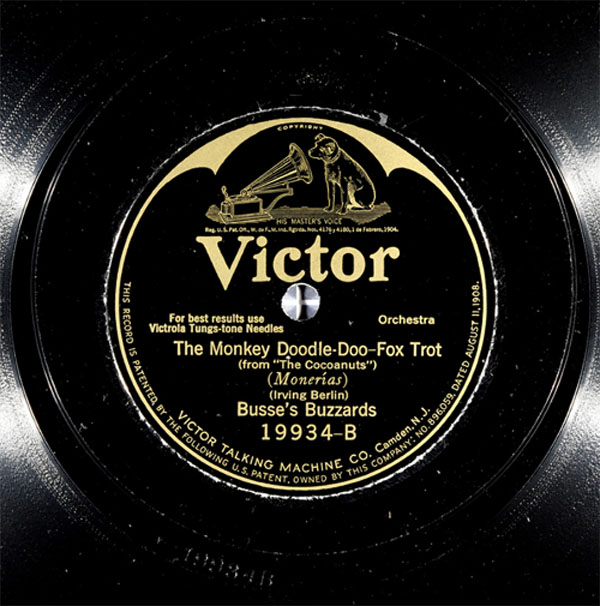
LISTEN
to "The Monkey Doodle-Doo - Fox Trot" played by Busse's
Buzzards, Victor Record 19934-B
recorded 12-28-1925 (Label and Recording Courtesy of i78s.org
and the Giovannoni Collection)
From Bryan's first Presidential
campaign in 1896 and his fight for 16-1 Free Silver to the last
days of his life and the Scope's Trial of 1925 the monkey on Bryan's
back is ironically summarized in popular culture. Bryan's literal
interpretation of the Bible as an expert witness at the Scope's
Trial, his fight against evolution, and his loss of three Presidential
elections continue to be what popular culture often associates with
the name William Jennings Bryan.
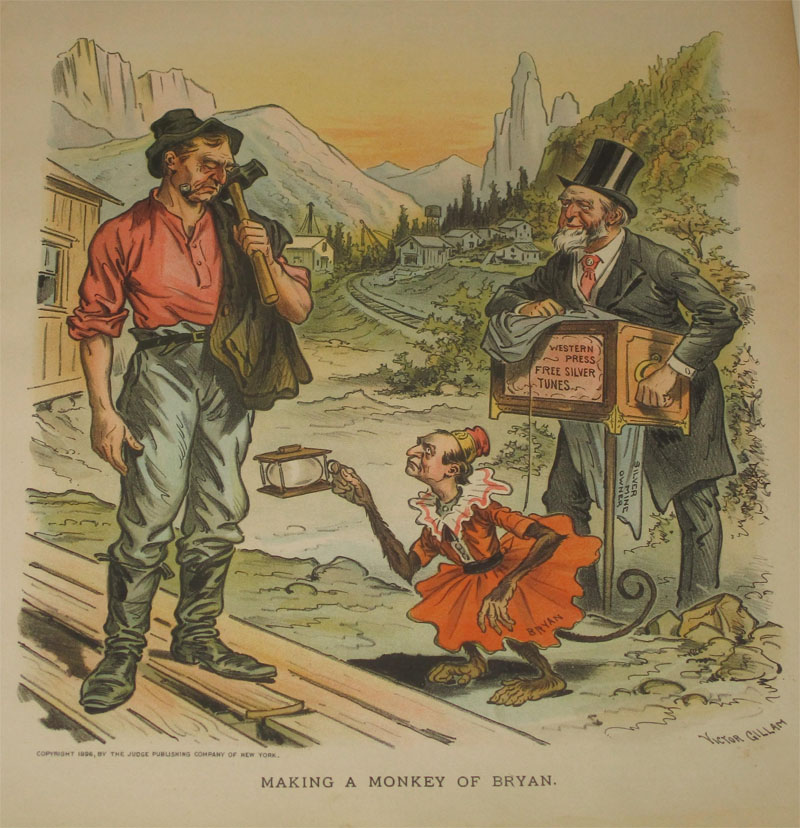
MAKING A MONKEY
OF BRYAN, Cover Illustration of Judge by Victor Gillam,
September 12, 1896
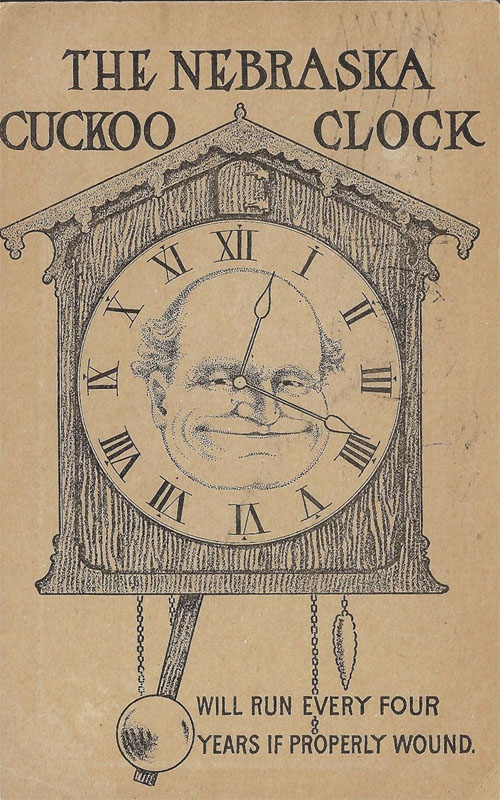
1908 Postcard referencing
his third Presidential race as Democrat's Nominee
References to William Jennings
Bryan in Willa Cather Books
Bryan is referenced in two of Cather's
stories set in Nebraska, O Pioneers, 1913 and One
of Ours, 1922 and one essay titled
"The Personal Side of William Jennings Bryan"
under the pseudonym of Henry Nickelman.
See the following in Phonographia's
PhonoBooks Library with respective
text referencing Bryan, explanatory notes, illustrations, ephemera,
comments, recorded words by Bryan and an essay written by Cather
about Bryan.
O
Pioneers, 1913
One
of Ours, 1922
"The
Personal Side of William Jennings Bryan" an essay
written by Willa Cather under the pseudonym of Henry Nickelman,
1900.
Additional Reading on Bryan's Phonograph
Recordings in the context of "Canned Speeches" see Spellman,
Susan V. and John P. Forren. “ Canned Speech: Selling Democracy
in the Phonographic Age. ” Enterprise & Society (2023): 1 –
24.
New York Public Library Citations
for Bryan-Taft - The Miriam and Ira D. Wallach Division of Art,
Prints and Photographs: Picture Collection, The New York Public
Library. "À New-York--les phonographes répétant, moyennant un sou
les derniers discours des deux candidats à la présidence" The New
York Public Library Digital Collections. 1908-10. https://digitalcollections.nypl.org/items/510d47e0-cd0a-a3d9-e040-e00a18064a99

Phonographia
|


